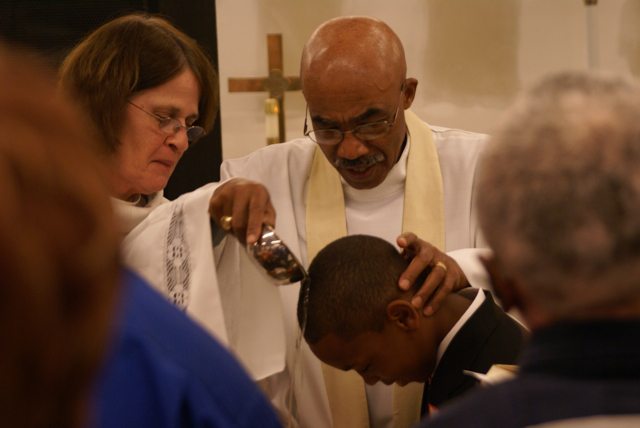First a word about these “devotionals.” You may have gathered that they are not fitting the nice little pattern as the various little devotional guides we can pick up in our church. They are, in fact, intended as my devotion as I try and take seriously that part of our lenten practice that says, “I invite you, therefore, in the name of the Church, to the observance of a holy Lent, by self-examination and repentance; by prayer, fasting, and self-denial; and by reading and meditating on God’s holy Word.”
It is not that I don’t need to work on the other bits of that quote, but I know I need to read and meditate more often on the Scriptures than I do. The trouble is that so often in my reading I end up hearing any number of scholars and critics in my head rather than a still small voice. So I am trying to be disciplined about reading and writing out my ruminations. I am finding them to be a bit of a hodgepodge, however, like the guy in the old army jacket clutching a grocery bag full of letters and muttering to himself in the corner. Yeah, that’s me! At any rate… I will press on, because that is the definition of discipline (or at least one).
So, enough of my mutterings, let us press on!

17 Therefore he had to become like his brothers and sisters in every respect, so that he might be a merciful and faithful high priest in the service of God, to make a sacrifice of atonement for the sins of the people. 18 Because he himself was tested by what he suffered, he is able to help those who are being tested. (Heb. 2:17-18)
I posted a week or so ago about a meditation offered at the youth retreat I attended in which the priest declared that she could not accept a God who required the death of anyone, and certainly not one who required the death of his own son. Her view, of course, is taken by many, many clergy today. While she was describing the view that she rejects the seminarian behind me whispered to his neighbor, “that’s replacement theory.” I wanted to say, “No you dolt! That is the atonement! It is a fundamental New Testament doctrine. Did you not learn that in seminary or are you not required to read Hebrews.
The truth is Hebrews is probably my favorite NT book, perhaps because it is so steeped in Scripture, and by that I mean, of course, Scripture as they new it then: the Law, the Prophets, and the Writings. It was clearly written by Jew who accepted Jesus as the messiah and brought to the discussion a prodigious knowledge of the texts. (My favorite suggestion for an author is Apollos.) It is also certainly (IMHO) pre-70 in its composition. It is a grand work and wrestles with that most troubling question, Why did the Messiah perish?
The last two verses of chapter two cited above are, in many ways, a creedal summary of why God became flesh, why he suffered and died, and the comfort that he now offers to all “those who are being tested.” It is concise, precise, and nice.
The concept of atonement, as I suggested in my previous post, is rejected by so many of modern times (modernity has, of course, been around for several hundred years) because of a (willful?) misunderstanding of the role of sacrifice in the ancient world. It was the language through which and by which people spoke to the gods.
The author of Hebrews, who is writing at a time when the Temple still stood and sacrifices were still being offered on the altar nonetheless declared Jesus both high priest and sacrifice. And not just an example of sacrifice or showing sacrificial love, but the very sacrifice itself. Those who find this image detestable and therefore reject it are not only(!) removing from Christianity the core or crux, if you will, that we are saved from sin through his sacrifice, but they are also depriving themselves theologically of the resolution of the system they despise. As the author of Hebrews reminds us, “For by a single offering he has perfected for all time those who are sanctified.” (Heb. 10:14)
It is truly finished.
But our lives continue and we live in this “in between” world and it is a difficult world to live in. And so Jesus came to suffer for us but also with us. “Because he himself was tested by what he suffered, he is able to help those who are being tested.” Be encouraged that Jesus is indeed our ever present help in times of need.



2 thoughts on “Lenten Devotion: High Priest and Sacrifice”
Chris, thanks for this. Good reminder in the Lenten season. I too have been working thru Hebrews (strangely enough) over the past few days. The atonement is so central. I just read today about a baby who was microwaved to death…then I think of the reason for Jesus’ death, resurrection, ascension…he was sacrificed so that that kind of stuff would go the way of the dodo (ultimately) and that his followers might follow the way of Christ and work to heal (and mourn and lament) that kind of brokenness in the world at present. Atonement indeed. Thanks for the post.
Heath Thomas